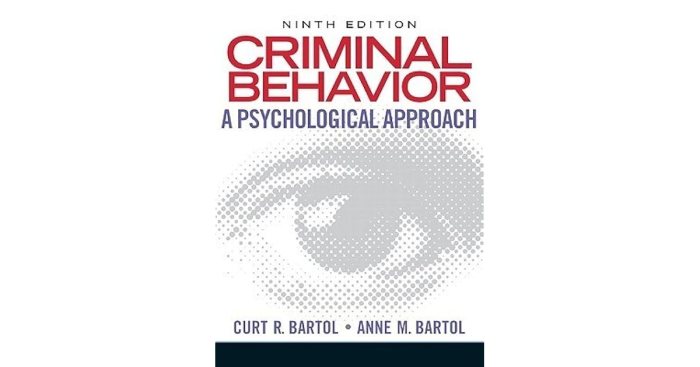Criminal behavior a psychological approach 12th edition pdf free – Delve into the captivating world of criminal behavior through the lens of psychology with “Criminal Behavior: A Psychological Approach, 12th Edition.” This comprehensive guide unravels the intricate tapestry of criminal behavior, offering a profound understanding of its psychological underpinnings.
With meticulous research and engaging prose, this book delves into the diverse psychological theories that seek to explain criminal behavior, from biological and sociological perspectives to the depths of the human psyche. It illuminates the interplay between risk factors, such as poverty, abuse, and mental illness, and their potential role in shaping criminal tendencies.
Psychological Theories of Criminal Behavior

Criminal behavior is a complex phenomenon that can be influenced by a variety of factors, including psychological factors. There are several different psychological theories that attempt to explain the causes of criminal behavior.
One of the most well-known psychological theories of criminal behavior is the biological theory. This theory suggests that criminal behavior is caused by biological factors, such as genetics, brain chemistry, and physical characteristics. There is some evidence to support this theory, such as studies that have shown that criminals are more likely to have certain genetic markers or brain abnormalities than non-criminals.
Another psychological theory of criminal behavior is the sociological theory. This theory suggests that criminal behavior is caused by social factors, such as poverty, inequality, and lack of opportunity. There is also some evidence to support this theory, such as studies that have shown that criminals are more likely to come from poor and disadvantaged backgrounds than non-criminals.
A third psychological theory of criminal behavior is the psychological theory. This theory suggests that criminal behavior is caused by psychological factors, such as mental illness, personality disorders, and cognitive distortions. There is also some evidence to support this theory, such as studies that have shown that criminals are more likely to have mental illness or personality disorders than non-criminals.
Each of these psychological theories has its own strengths and weaknesses. The biological theory is supported by some evidence, but it is difficult to determine the extent to which biological factors contribute to criminal behavior. The sociological theory is also supported by some evidence, but it is difficult to determine the extent to which social factors contribute to criminal behavior.
The psychological theory is supported by some evidence, but it is difficult to determine the extent to which psychological factors contribute to criminal behavior.
Risk Factors for Criminal Behavior

There are a number of risk factors that can contribute to criminal behavior, including poverty, abuse, and mental illness.
Poverty is a major risk factor for criminal behavior. People who live in poverty are more likely to experience violence, abuse, and neglect. They are also more likely to lack access to education, job training, and other resources that can help them to succeed in life.
As a result, they may turn to crime as a way to survive or to escape their circumstances.
Abuse is another major risk factor for criminal behavior. People who have been abused are more likely to experience mental health problems, such as depression and anxiety. They are also more likely to engage in risky behaviors, such as substance abuse and violence.
As a result, they may be more likely to commit crimes.
Mental illness is also a risk factor for criminal behavior. People with mental illness are more likely to experience cognitive distortions and difficulty controlling their impulses. They may also be more likely to experience hallucinations and delusions, which can lead to criminal behavior.
In addition to these risk factors, there are a number of other factors that can contribute to criminal behavior, such as genetics, personality traits, and environmental factors.
Assessment and Treatment of Criminal Behavior: Criminal Behavior A Psychological Approach 12th Edition Pdf Free

The assessment and treatment of criminal behavior is a complex process that involves a variety of professionals, including psychologists, psychiatrists, and social workers.
The first step in the assessment of criminal behavior is to conduct a comprehensive interview with the individual. This interview will include questions about the individual’s history, current circumstances, and criminal behavior. The interviewer will also observe the individual’s behavior and mental status.
In addition to the interview, the assessor may also conduct a variety of psychological tests. These tests can help to assess the individual’s intelligence, personality, and mental health. The assessor may also order a medical evaluation to rule out any physical conditions that may be contributing to the individual’s criminal behavior.
Once the assessment is complete, the assessor will develop a treatment plan for the individual. This treatment plan may include a variety of interventions, such as psychotherapy, medication, and social skills training.
Psychotherapy is a type of counseling that can help the individual to understand the causes of their criminal behavior and to develop coping mechanisms for dealing with their problems. Medication can also be helpful in treating criminal behavior, especially if the individual has a mental illness.
Social skills training can help the individual to learn how to interact with others in a positive and productive way. This can help the individual to avoid getting into conflict with others and to stay out of trouble.
The treatment of criminal behavior is a long and complex process, but it can be effective in reducing recidivism and helping the individual to lead a more productive life.
Prevention of Criminal Behavior
There are a number of strategies that can be used to prevent criminal behavior, including early intervention programs, community policing, and education.
Early intervention programs are designed to identify and help children and adolescents who are at risk for criminal behavior. These programs may provide a variety of services, such as tutoring, counseling, and mentoring. They can help children and adolescents to develop the skills and coping mechanisms they need to succeed in life and to avoid getting involved in crime.
Community policing is a strategy that involves law enforcement officers working closely with the community to identify and address the root causes of crime. This can involve a variety of activities, such as foot patrols, community meetings, and problem-solving initiatives.
Community policing can help to build trust between law enforcement and the community and to reduce the incidence of crime.
Education is also an important strategy for preventing criminal behavior. Education can help children and adolescents to develop the critical thinking skills they need to make good decisions and to avoid getting involved in crime. It can also help them to develop empathy and compassion for others.
There are a number of other strategies that can be used to prevent criminal behavior, such as providing job training and employment opportunities, reducing poverty, and improving access to mental health services. By working together, we can create communities that are safe and healthy for everyone.
Detailed FAQs
What are the key psychological theories of criminal behavior?
Biological, sociological, and psychological theories provide different perspectives on the causes of criminal behavior.
How do risk factors contribute to criminal behavior?
Factors such as poverty, abuse, and mental illness can increase the likelihood of engaging in criminal activity.
What are the effective methods for treating criminal behavior?
Cognitive-behavioral therapy, medication, and other interventions have been shown to be effective in reducing criminal behavior and recidivism.